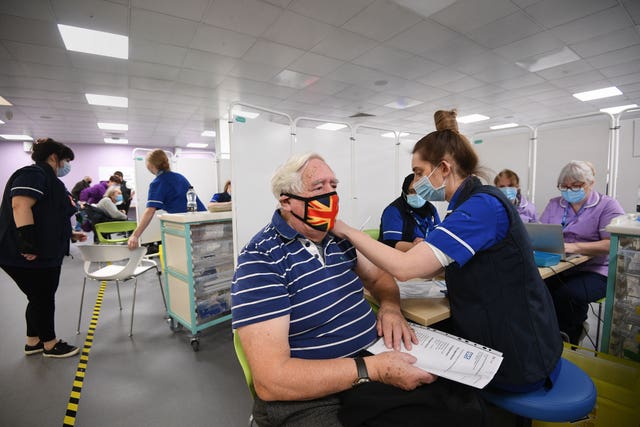The UK has not yet hit the peak of the current wave of Covid-19 infection, with the next few weeks being “the worst” of the pandemic for the NHS, England’s chief medical officer has warned.
Professor Chris Whitty said the vaccine rollout offered hope that lockdown restrictions could be lifted in the coming months, but described the current UK death rate as “appalling”.
During a BBC phone-in on the current high case rates, he said: “I don’t think we’re yet at the peak, I’m afraid.
“I think we will be at the peak if everybody can double down and absolutely minimise their contacts.
“The point of the lockdown is to bring that forward, but it only works if everyone really thinks about every individual interaction they have and try and minimise them.”
Whitty said the new variant of coronavirus was causing a “significant problem”, telling BBC Breakfast: “We will get through together, but at this point in time we’re at the worst point in the epidemic for the UK.”
The situation in the NHS is very serious and the number of people in ICU is rising rapidly.
We are improving our knowledge on how best to treat people in ICU thanks to research, but hundreds of people a day are currently dying.
We must all take the lockdown very seriously. https://t.co/ByWz4ejwz5
— Professor Chris Whitty (@CMO_England) January 8, 2021
Asked if coronavirus is being spread outdoors, Whitty said the risks were much lower than for indoors, but said problems could occur if people gathered in groups, such as huddled round a market stall.
It comes as Boris Johnson has reportedly discussed the prospect of introducing tougher controls to ensure the public abide by the restrictions, such as stopping people exercising with one other person.
Whitty told BBC Radio 4’s Today programme the risks from, for example, jogging past someone were “very low”, but said there could be an argument for wearing masks in some circumstances.
“If people for example are crowded together in a queue outdoors, if they’re really huddled together round a market stall or something – that is a risk with this virus – and in that situation there might be some logic to people thinking about wearing masks.”

Pressed on whether people should wear masks in all outdoor settings, he said the most important thing was actually that people stayed home unless their journey was essential.
“I think that the much more important thing is that people should not be leaving their home unless they absolutely have to,” he said.
“And where they do, try and keep their distance from people.”
He added: “In a sense tinkering with the rules may be useful, but the far more important thing is that everybody abides by the spirit of the rules that are there at the moment.
“Everybody knows what they need to do. And I think that’s the key thing – minimise the number of contacts.”
Whitty suggested measures could still be needed until “some time in the spring” to stem the spread of the virus.
“We’re really going to have to do a significant action for all of us for several more weeks until probably some time in the spring for very much of what we have to do,” he said.
Last week I declared a major incident in London because our hospitals are at risk of being overwhelmed by COVID-19. Every single one of us must take action now to protect each other and our NHS. Please, stay at home.
— Mayor of London (gov.uk/coronavirus) (@MayorofLondon) January 11, 2021
On Sunday, a public health director said coronavirus cases in Wales are “cause for serious concern”, while Scotland’s deputy first minister John Swinney said Scotland is facing “a very alarming situation” with the virus.
Northern Ireland’s health chiefs said the number of Covid-19 patients will double by the third week of January, with one trust boss saying “our hospitals are facing into an abyss”

















